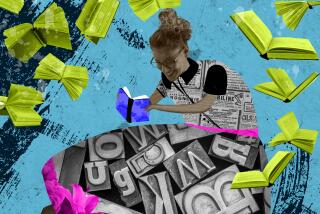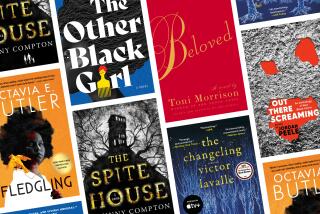THE PEOPLE COULD FLY: AMERICAN BLACK FOLKTALES told by Virginia Hamilton; illustrated by Leo and Diane Dillon (Knopf: $12.95; 180 pp.; all ages).
This year, we finally saluted the late Rev. Martin Luther King Jr. by remembering the day of his birth with a national holiday. How appropriate then that childrenâs literature be enriched by a work of art so inspiring it too has earned notice: the 1986 Coretta Scott King Award. Given annually since 1970, the award is designed to âcommemorate and foster the life, works and dreamsâ of King and to honor his widow for continuing to seek peace and world brotherhood. Author Virginia Hamilton is a deserving recipient.
To cite Hamiltonâs many awards is beside the point, but it is worth mentioning that her âM. C. Higgins, the Great,â published in 1974, won more honors than any other childrenâs book, including the John Newbery Medal, the National Book Award, the Hans Christian Andersen Honor Book and the Boston Globe-Horn Book Award. Now, in âThe People Could Fly,â she revives our literary heritage with 24 American black folktales, poignant all.
Told in easy-to-understand dialect, the stories echo the voices of fugitives and slaves, some of whom were the authorsâ ancestors. We are reminded of the deep sorrow and fears of an oppressed people, but also that the human spirit, however enslaved, still feels love and hope. It is this spirit Hamilton celebrates.
She recounts animal trickster tales, reintroducing Bruh Rabbit and Tar Baby. Also, devil and ghost stories, exaggerations, fairy tales, escape fantasies and most moving, the true Slave Tales of Freedom, in particular the title story from which the above artwork is taken. Each narration is annotated, explaining origin and meaning; a bibliography suggests other versions.
Credit for superiority must be shared with Leo and Diane Dillon for their 40 fine illustrations--for which they received an honorable mention--and which evoke the emotions and dignity of the black people without stereotyping.
The tales in âThe People Could Flyâ lend themselves to being read out loud, just as the storytellers themselves recited long ago. They should be read so our children will know a vital part of American culture.
More to Read
Sign up for our Book Club newsletter
Get the latest news, events and more from the Los Angeles Times Book Club, and help us get L.A. reading and talking.
You may occasionally receive promotional content from the Los Angeles Times.








